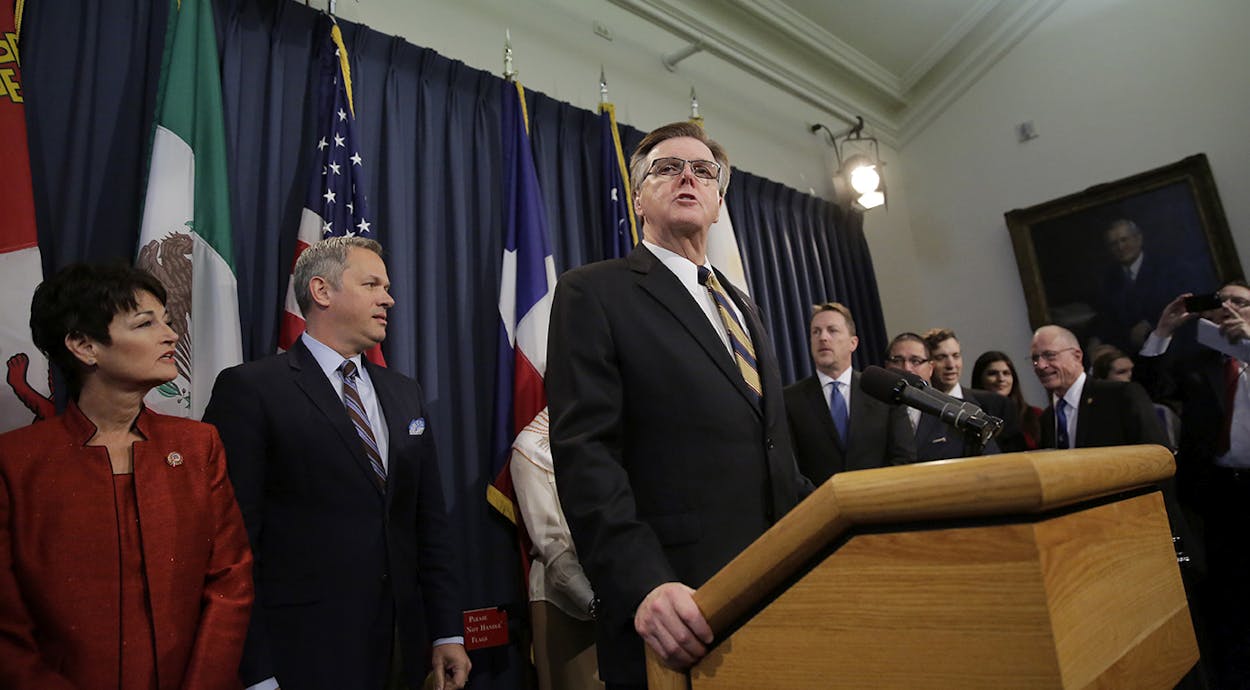There’s a saying in the Legislature: Members, vote your districts. But when you look at the votes of state Senators Charles Perry of Lubbock, Dawn Buckingham of Horseshoe Bay, and Lois Kolkhorst of Brenham, you have to wonder whether their constituency is comprised of people in their districts or Lieutenant Governor Dan Patrick. The three of them, whose districts span one-third of Texas almost contiguously—from the Panhandle southeast to the coast—consistently voted for the lieutenant governor’s priorities throughout this session. Not once did one of them vote against Patrick’s top twenty legislative priorities, or his full thirty priorities, for that matter.
Let’s take a look at their votes on two Patrick priorities: creation of private school vouchers and lowering local property tax revenue caps.
In rural Texas, independent school districts are often the center and future of local society, as well as a primary economic driver. Voters are far removed from “school choice”—geographically and philosophically. Perry, Buckingham, and Kolkhorst each voted for Patrick’s private school voucher plan. Republican Senators Kel Seliger of Amarillo and Robert Nichols of Jacksonville have similar dynamics and results in their districts, and both voted against vouchers. And even though the Lubbock ISD opposed the bill in all of its iterations, Perry voted for it after he amended it to carve out rural school districts. The Lubbock ISD apparently saw even the reduced bill as the camel’s nose sticking through Perry’s tent.
But members of the House are closer to the people. Their districts are smaller, and they run for re-election every two years instead of four like the senators. Senators Perry, Buckingham, and Kolkhorst don’t face the voters again until 2020, but the state representatives in their districts face the voters next year. So how did they vote on “school choice”? Twenty-two out of 28 representatives who call these three their senator voted against vouchers in the House this session. All 28 are Republican, so this wasn’t a partisan vote. It was a vote-your-district vote for lawmakers who are accountable to voters instead of Dan Patrick.
The six pro-voucher House members accounted for just five percent of the total 2016 GOP primary votes for all representatives within the three districts. That should send a message to Perry, Buckingham, and Kolkhorst that they are on the wrong side of their constituents.
The triumvirate’s votes for private school vouchers don’t add up mathematically. Nor do they politically.
In Kolkhorst’s district, eight of ten state representatives voted nay on vouchers. Three of those nays overlap Kolkhorst’s Fort Bend County lines, where she received 28 percent of her 2016 primary vote. It also the county from which Kristin Tassin, president of the Fort Bend ISD Board of Trustees, has written blistering, well-publicized anti-voucher columns in statewide publications before and during the session.
Buckingham won an open seat in a district where eight of ten state representatives voted against vouchers. New to voters, she maintained a moderate school choice message throughout the 2016 primary. However, some voters might’ve begun to feel like they loaded the wrong wagon when she donned a voucher-yellow scarf and proclaimed it was time to pass school choice in Texas at a Capitol rally in January.
If vouchers demonstrate the extent to which Patrick’s rural triumvirate is compelled to vote against constituencies (voters and non-voters alike), support for property tax revenue caps indicates the scope of turmoil they are willing to bring upon their respective districts.
Billed as “property tax reform” by Patrick and a probable cause of bankruptcy by rural leaders, Senate Bill 2 would have required local governments to hold automatic November rollback elections before property tax revenues can increase 5 percent or more from the previous year (currently, signed petitions can call elections at 8 percent or more). In rural areas, officials manage the budgetary algebra of non-growth populations, capped tax rates, land valuations that shift with annual rainfall and global farm commodity prices, plus potential natural disasters and capital murder trials, as well as erratic mineral valuations that can hit city and county ledgers like a natural disaster.
In an nine-minute floor speech leading up to the vote, Perry overviewed rural problems with the bill, stating that most in his 51 counties see it “as a personal assault on their ability to govern on a local level.” And even though “a lot in this session has become very tough on my rural communities on so many levels,” Perry voted for SB 2, along with bill co-sponsors Buckingham and Kolkhorst, as well as Nichols. Seliger voted nay again.
Most state political observers now accept the political reality this publication put on its February cover: Dan Patrick is in charge of Texas.
Some privately sympathize with the “immense pressure” senators are under. But others don’t. Especially those—*cough* House members *cough*—who believe senators get the chamber they deserve. A Patrickocracy was inevitable in a Texas Senate that passes budgets unanimously and raises no points of order when constitutional periods are violated, a chamber that two years ago changed its rules to lower the threshold for debate from 20 to 19 votes (and in the regular session of the Eighty-fifth Legislature, not one of our trio voted against debate, even though a single nay vote could’ve prevented vouchers or caps from reaching the floor).
Patrick’s drive of this legislative session launched from such a Senate, and was fueled by rural senators who would rather cozy up to Patrick than serve the people who elected them.
Jay Leeson is a West Texas businessman whose hobbies include being a Lubbock-based political columnist and talk radio host. Follow him on Twitter @jayleeson






